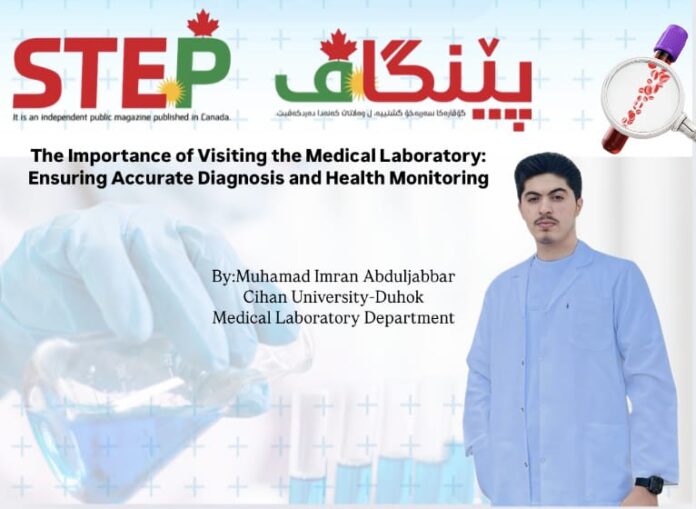By: Muhamad Imran Abduljabbar
Cihan University-Duhok
Medical Laboratory Department
Medical laboratories are the unsung heroes of healthcare. Though their work often takes place behind the scenes, the impact of their findings is front and center in nearly every medical decision—from the first signs of illness to long-term treatment strategies. Their role is vital, not only in diagnosing diseases but in preventing them and ensuring that treatments are working effectively.
Laboratories are the backbone of evidence-based medicine. Physicians rely heavily on lab results to confirm diagnoses, monitor health conditions, and evaluate the effectiveness of prescribed treatments. Laboratory tests can detect changes in the body long before symptoms appear, making early intervention possible. This can mean the difference between a minor health adjustment and a serious medical condition.
Take, for example, the case of diabetes. A simple blood test that measures glucose or HbA1c levels can identify prediabetes or early-stage diabetes before any symptoms become apparent. With this information, patients can take preventive measures—such as adjusting their diet, increasing physical activity, or beginning medication—to avoid irreversible complications like kidney failure, nerve damage, or vision loss. Without these timely tests, many individuals would continue unaware of their risk until severe symptoms force emergency intervention.
Similarly, laboratory testing plays an essential role in identifying infections. A complete blood count (CBC) can indicate the presence of an infection, while more specific tests can detect the exact organism responsible. Early detection allows healthcare providers to prescribe the right antibiotics or antiviral medications, preventing the infection from spreading or becoming life-threatening.
Beyond diagnostics, medical labs are instrumental in ongoing treatment and disease management. For patients with chronic conditions such as hypertension, high cholesterol, or cancer, regular lab work helps doctors track progress and adjust therapies as needed. It ensures that treatments are not only prescribed but are also effective. If a medication is causing adverse effects or is not producing the desired results, laboratory monitoring can catch this early and guide appropriate changes.
Another critical area where medical laboratories shine is in preventive healthcare. Many people believe that if they feel healthy, there is no need for a check-up. However, many serious conditions—such as high blood pressure, high cholesterol, liver disease, or certain cancers—can be present without obvious symptoms. Regular lab visits can uncover these issues in their earliest stages when they are most treatable and often reversible.
Despite their importance, there are still many misconceptions surrounding medical tests. Some people avoid them due to fear of needles or concerns about the results. Others rely on self-diagnosis using online tools or over-the-counter kits. While technology is advancing, nothing replaces the accuracy and reliability of professional laboratory testing. Trained technicians and pathologists follow strict protocols to ensure precision, and their findings are interpreted within a medical context that self-diagnosis simply cannot replicate.
Medical laboratories are not just places where blood or urine is collected—they are pillars of prevention, diagnosis, and healing. Their contributions to healthcare are immense and indispensable. Whether you are undergoing a routine check-up, managing a chronic illness, or seeking answers for troubling symptoms, the laboratory is where your journey toward better health often begins.
In today’s fast-paced world, it’s easy to postpone medical appointments or skip routine tests, especially when everything seems fine on the surface. But health is not something to gamble with. Regular laboratory tests are a proactive step toward maintaining well-being, preventing disease, and receiving timely treatment.
In summary, medical laboratories form the foundation of modern healthcare. They are essential to early disease detection, treatment monitoring, and preventive care. Their role cannot be overstated, and their impact is felt by every patient, every day. Choosing to prioritize regular lab testing is not just a health choice—it’s a life-saving decision.





